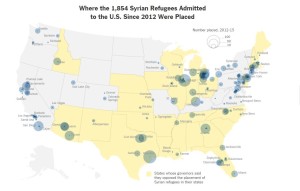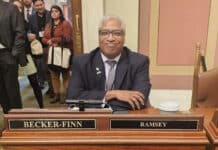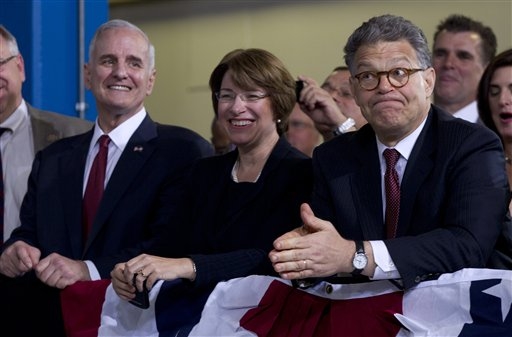After terrorists with the Islamic State (ISIS) killed at least 129 people and injured 352 more in Paris in seven coordinated attacks last Friday, serious questions are being asked about who’s coming into the United States under the United Nations refugee resettlement program. One of the Paris assailants got into the European Union posing as a refugee and another had fought with ISIS in Syria according to The Telegraph.
Despite growing concerns that Syrian refugees can’t be properly vetted before entering a country for resettlement, Governor Mark Dayton released a statement yesterday indicating that Minnesota will continue to accept new refugees:
“My first priority is to protect the safety of the people of Minnesota. I have been assured by the White House that all refugees are subject to the highest level of security checks of any category of traveler to the United States,” the Governor’s statement read.
Dayton recently spoke alongside the executive director of the Council of American Islamic Relations at community awareness event in St. Cloud where he told Minnesotans concerned with refugee resettlement to “find another state” and “go find somewhere else.”
The horrific attacks in Paris prove the public danger resulting from the inability to properly vet refugees, but Minnesota’s Democrat leaders appear to have no intention of changing course from their previous calls to welcome more to the state.
KSTP reports today that only one Syrian family resettled in Minnesota this year. According to the New York Times, the number settled in Minnesota since 2012 is approximately sixty people of the 1,864 Syrians brought here since 2012. The Obama administration has recently committed to place an additional 10,000 Syrian refugees in the U.S. by the end of the fiscal year in October 2016. Nobody knows how many will end up in Minnesota.

Governors from 27 states have now told the federal government that they’re unwilling to take in new Syrian refugees. Yet Kevin Appleby, the director of migration policy for the U.S. Conference of Catholic Bishops, told CNN “when push comes to shove, the federal government has both the plenary power and the power of the 1980 Refugee Act to place refugees anywhere in the country.” Neighboring states of Wisconsin and Iowa are included on the list of Governors who have stated opposition to Syrian refugees coming in. Other than Minnesota, seven other states have stated they will accept the refugees including Colorado, Connecticut, Delaware, Hawaii, Pennsylvania, Vermont, and Washington. With the constitutional right to travel freely between states in the U.S., national security isn’t addressed with such a piecemeal approach. Still, legislatures could enact laws to block welfare funds from flowing to new residents, which may make it less likely that government-contracted agencies place refugees in those states.
Alpha News reported in September that Senators Amy Klobuchar and Al Franken were two of only fourteen U.S. Senators to ask the Obama administration to admit 65,000 Syrian refugees by the end of 2016. Klobuchar called the increase in Syrian refugees resulting from her letter “a positive sign and a good beginning” on NPR in September and spoke specifically about the benefits to Minnesota about taking in the refugees:
“We have an immigration debate raging right now in our country. And the refugees are part of that debate. But I will say these are legally vetted, screened refugees that would come in. And they can actually fill some of the jobs that we have available in states like mine, where we have lower unemployment rates,” Klobuchar said.
Franken told the Rochester Post Bulletin on Saturday that a political solution was needed to defeat ISIS after the Paris attacks and referred to the G20 talks. “What’s heartening about the talks that we’ve had in Vienna is that there are so many different parties there — including Saudi Arabia, including Iran, including Russia, including the United States,” Franken said.
WCCO’s Esme Murphy asked Franken about the Islamic State threat to Minnesota on Sunday, “no other state has had as many young people try or actually go over and fight for ISIS. Are we safe here? Are you assured that the federal goverment is doing as much as they can to protect us here in Minnesota?” Murphy asked. Franken replied that it was a “very small number of young men and women”that had left Minnesota to train with ISIS and that “each one is a tragedy to their family.” He also said that we had to “vet people who come in” but must “do part of our job like the rest of the international community” to take in refugees.
Representative Keith Ellison also joined the cause in September with his own letter asking the President to grant “emergency asylum” and “open our borders to more Syrian refugees.”
Minnesota has the largest number of Somali refugees in the country. Minneapolis City Councilman Abdi Warsame said that the total Somali population in the state is 100,000 at a Politico panel discussing terrorism held in Brussels, Belgium just two days before the attacks in Paris. The Star Tribune reported last spring that 17,300 Minnesota Somalis are on food assistance, 5,950 are on family cash assistance, and that these numbers don’t include U.S. born Somalis living in the state. There have been ongoing issues in Minnesota’s Somali community and FBI programs set up to combat radicalization.
The Obama administration announced in September that the U.S. would take in a total of 85,000 refugees in the 2016 fiscal year and an additional 100,000 in 2017. The ceiling was set at 70,000 in fiscal year 2015. No Congressional approval was required and the program is organized by the United Nations refugee agency.
With 10,000 refugees from Syria set to enter the country, the concerns about security remain. The AP reported in September that “logistical and resource hurdles remain. For example, there is no suitable facility in Lebanon where Syrian refugees can be taken for interviews, so no interviews are occurring, according to the State Department.” Today, the U.N. High Commissioner on Refugees called for creating “massive reception capacities at entry point” from where “people can be distributed orderly” to various countries according to the A.P.
Calls to Senators Klobuchar and Franken’s offices to comment for this story were not returned and no press releases regarding the Syrian refugee resettlement issue have been posted to their official Senate websites despite their recent leadership on the issue.
U.S. taxpayers have given $4.5 billion to aid refugees in Syria since 2011.












